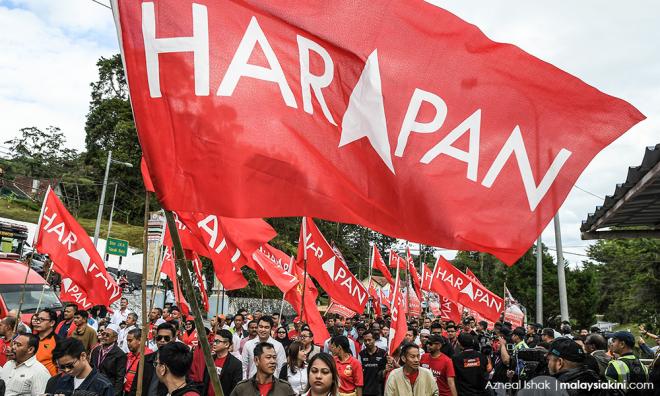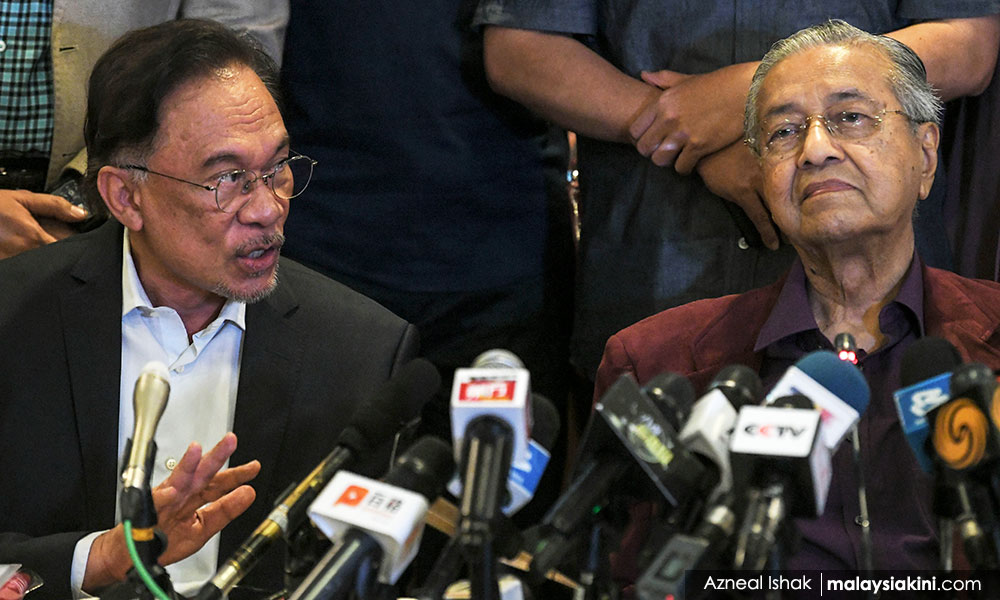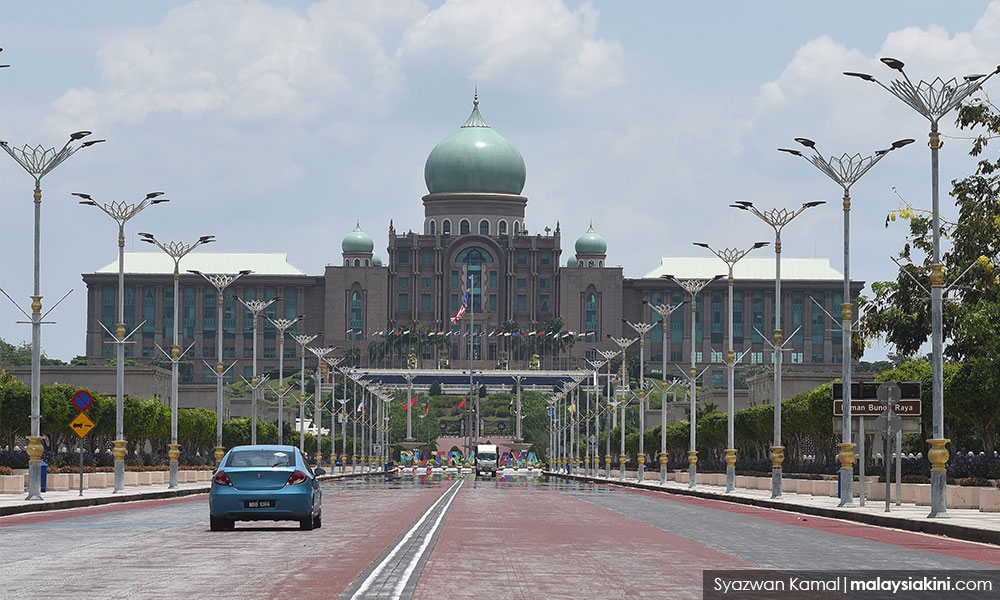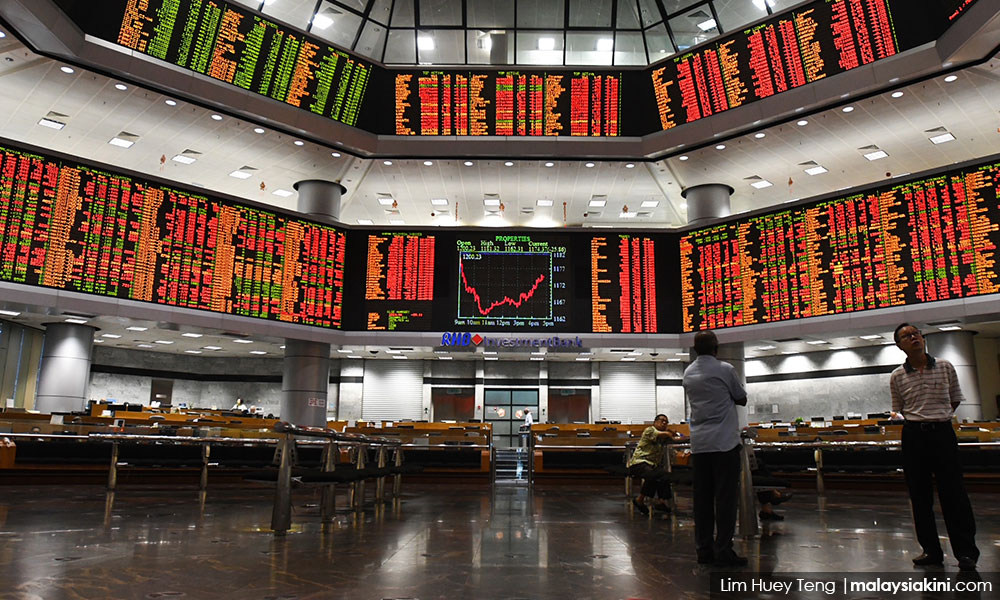
Within a year, Umno was able to turn around its devastating defeat of May 2018 and reengage its political base, tapping into its resource and machinery advantages. Within less than another year, it was able to return to power in a new coalition. Despite factionalism and not being strong enough to hold power on its own, Umno is best posed to secure the most support if elections are called soon. They (and PAS) have a sweet spot – in power but not responsible for that power.
Today, three months have passed since the Pakatan Harapan government collapsed. To date, there has been little serious reflection on the reasons that the government fell. Blame has focused on those who grabbed power. Analyses of Harapan’s role – what little there is of it - has centred on the personalities involved – especially Dr Mahathir Mohamad. This piece aims to push the discussion further, to draw attention to additional issues that should be addressed for Harapan to restore hope to its supporters.
Leadership trap
Foremost, is the problem of leadership. Repeatedly the Malaysian public has been caught in the destructive distrust of Harapan’s two leaders – Anwar Ibrahim and Mahathir. These tensions continue to divide the opposition coalition and prevent it from moving forward. Both men have been badly damaged, with large shares of the electorate wanting to move beyond these individuals.
Besides personal loyalty, support for these leaders within Harapan stems from perceived strategic strengths of both men – Mahathir’s appeal to parts of the Malay ground and Anwar’s appeal to reformers as a long-standing leader fighting for change. Both of these arguments lost ground during Harapan’s tenure in office.
The by-elections before February this year showed serious decline in Malay support – as the Mahathir factor had completely eroded. Nowhere was this clearer than in the Tanjong Piai by-election in Johor. For Anwar, the focus on his own role as leader, as opposed to reforms, has undercut his credibility with voters. The distrust of the two men for each other is being overshadowed by distrust of these leaders in the electorate – including the voters that helped bring about the May 2018 victory.

Given Malaysia’s younger population and leadership divisions, the time is ripe for new leaders to emerge. Harapan has talented younger leaders. There also is considerable talent outside of political parties – young Malaysians who are serving the country but are being turned off from the confines of leadership competition and nastiness of politics. Now, in opposition, Harapan has a chance to regroup and rebuild its leadership cohort. An essential element of this is to form a shadow cabinet to allow these different talents to grow and to reach outside the parties.
Emotional polarisation
Harapan got into office in 2018 by combining anger with hope. Of these two, anger was the main driver – as the opposition has long stoked resentments and frustrations. As its chances of victory got closer, its traditional frustrated base became more hopeful (envisioning a new Malaysia), but ultimately it was the mobilisation anger of younger and traditional Umno voters, state nationalism of East Malaysians and marginalisation of the lower classes that pushed Harapan over the electoral finish line in May two years ago.
Both sides of the political divide do this – appeal to their base through negative emotions – fear, displacement, insecurity and anger. These emotional appeals are intertwined around the sensitive and divisive cords of race and religion, and the country’s deep political polarisation.
Najib Abdul Razak’s leadership as prime minister relied on further accentuating polarisation to keep himself in office in 2013. The failure to dominate the "emotional" sentiments in May 2018 was an integral part of his downfall. Since being rejected by the majority of the electorate in GE14 and as he works to forge a political comeback, he has collaborated with PAS (which he was effectively doing since 2015) to galvanise resentments, to build back the core that eroded. There are costs to mobilising these divisive emotions, not only is the country harder to govern, these zero-sum sentiments only further polarisation.
Back to the base
Harapan, on its part, expects that potential anger towards Muhyiddin Yassin’s Perikatan Nasional (PN) government will work in its favour moving forward. This assumption is premature at this juncture as Harapan’s own base has eroded.
Harapan has underestimated three important issues. First of all, its failure to respond to its base while in office. A majority of non-Malays supported Harapan and they have few concrete substantive policy areas that they can identify with the Harapan government – around education, discrimination and inclusion, to name a few arenas. Harapan core supporters were taken for granted and, in fact, beaten up on as Mahathir failed to respect the voters that put him into office.

Equally important were voters across ethnic communities who wanted reform – in political institutions and practices as well as the economy. After one year on a honeymoon high, the hopes of many Harapan supporters were badly dashed in policy reversals and an unclear set of policy priorities poorly communicated. This sentiment, the loss of hope, stills stings for many voters – in cynicism and a quiet distancing from politicians at large.
Economic performance
Harapan apparently believed that they were going to be in office for much longer than they were. Without clear priorities, they squandered opportunities for reform. Debates surround what they accomplished – especially as much of it in merit-based appointees and Parliament are being quickly dismantled. Important changes to the administration of the media, rule of law and anti-corruption are also being currently tested.
Harapan has to deal with the perception that it did not fulfil what it promised to do – that some of its own members were enthralled with power and position as opposed to implementing programmes and public service. While expectations were high, arguably unattainable, and resistance was strong (even within Harapan itself), Harapan’s reform record in office has to be grappled with.
Nowhere is this clearer than in the management of the economy. Growth slowed. Contracts were cancelled, sometimes arbitrarily for perceived political ties with the previous regime rather than on merits. Those displaced from funds were upset with the new context, and those who wanted access to funds were unhappy when they were not forthcoming. Mahathir’s resistance to pumping funds into the economy to stimulate growth and address the more vulnerable lower classes further undercut Harapan politically. The Shared Prosperity initiative had no real traction and minimal substance.
Despite some good ideas, Mahathir’s government lacked clear direction and an overall vision on how to develop the economy in today’s interconnected world. Measures to develop a "gig" economy were uneven and as the Covid-19 crisis has shown, did not necessarily provide the job security needed. The myopic attention on 1MDB's clean-up and debt management (both handled well despite the lack of high-profile completed prosecutions) did Harapan a disservice as this was not felt by the public at large.
Opposition-like thinking – that all those connected to the system were the enemy – undercut possible alliances needed to build relationships to transform the economy. The dominant mode inside was competition rather than cooperation. The end result was "back to normal" practices that involved patronage, maintaining monopolies and other imbalances/strangleholds in the economy and limited restructuring of the government-linked sector.

Ultimately, one of the challenges Harapan faces is winning back the support of the business community, many who are resistant to reform and were frustrated with Harapan’s lacklustre economic performance. By 2018, the mood of much of the business community overall had moved toward accepting change. They wanted more deliverables that were not delivered. Whether this sentiment towards change will reemerge surrounding the economic troubles ahead will require not just riding on negative sentiments but developing clear programmes and priorities to strengthen and recover Malaysia’s economy.
Clearer ‘New Malaysia’ vision
Harapan spoke regularly about "New Malaysia" and recent statements reaffirm that they are tied to this concept. In office, there never was a clear articulation of what this concept meant. For most Malaysians, this rubric became the handle for their own dreams for the country’s future – and there are many different (often conflicting) dreams.
The lack of clarity over "New Malaysia" stemmed from Harapan’s own differences on this vision. Arguably the biggest sticking point was how to address long-standing differences over race and religion. Within Harapan, these issues undercut cooperation – as there are different perspectives about the role of Islam, prioritisation of race over other social cleavages in policy, state rights/autonomy and rights of communities, among others.
Moving forward, experience calls out for clearer priorities. Rather than be a strategic alliance to remove one person – Najib – there is a need to articulate what New Malaysia stands for – and this should not just be a laundry list of (many unrealistic) promises in an election manifesto.
Any essential element of moving forward involves addressing public perception problems. The demonisation of the DAP stands as a serious obstacle for Harapan to win broad support across races. The lack of broad Malay support for Harapan is a product of the effectiveness of the Umno-led campaign. This effectiveness, however, is not just the result of the mobilisation of fear, insecurity and ethnic differences, but the connection to the hubris and confrontational style of some DAP leaders. This party – like others across the political divide – have lost touch with its own base and has failed in outreach outside of its base.
DAP’s image problem is Harapan’s image problem. From what the coalition stands for to its leadership and legacy in the short period in office, Harapan cannot restore hope until it meaningfully addresses concerns that go beyond the conflict of two men and their loyalists. This involves turning away from elite politics to more substantive engagement with the public and party grassroots. This is difficult to do when one Harapan party (PKR) is involved in a purge and broader sentiments surrounding the loss of government still sting.
If Harapan is to restore hope, it needs to regroup, rebuild, rebrand, re-strategise and reengage its supporters– the starting point is to think seriously about the reasons they lost the harapan of many of their supporters and Malaysians at large while in office.
BRIDGET WELSH is a Senior Research Associate at the Hu Fu Centre for East Asia Democratic Studies, a Senior Associate Fellow of The Habibie Centre, and a University Fellow of Charles Darwin University. She currently is an Honorary Research Associate of the University of Nottingham, Malaysia's Asia Research Institute (Unari) based in Kuala Lumpur. - Mkini



No comments:
Post a Comment
Note: Only a member of this blog may post a comment.